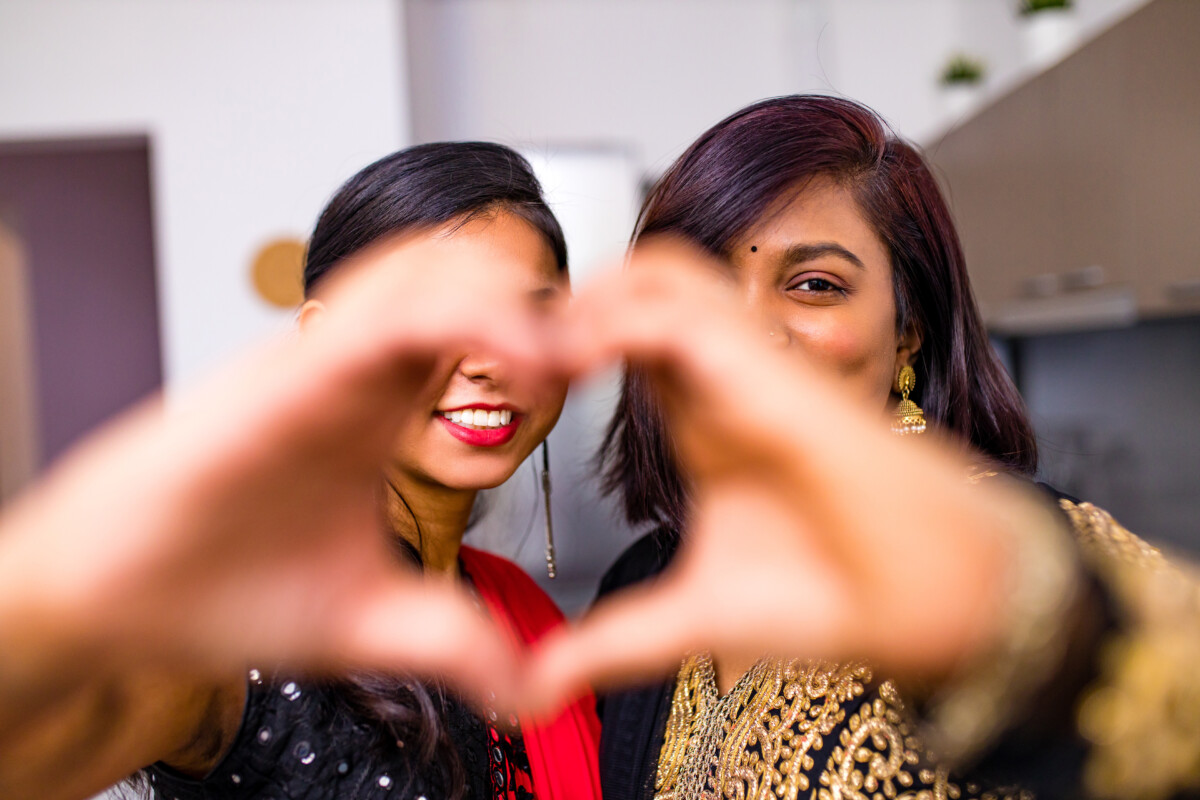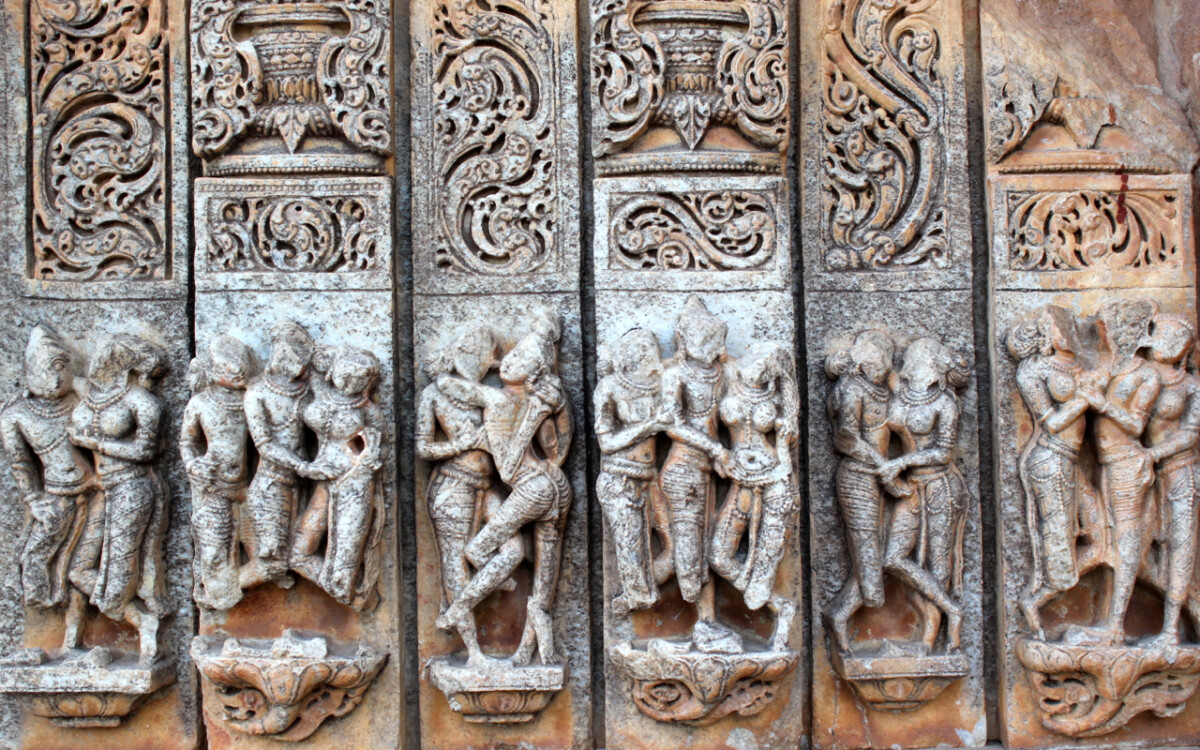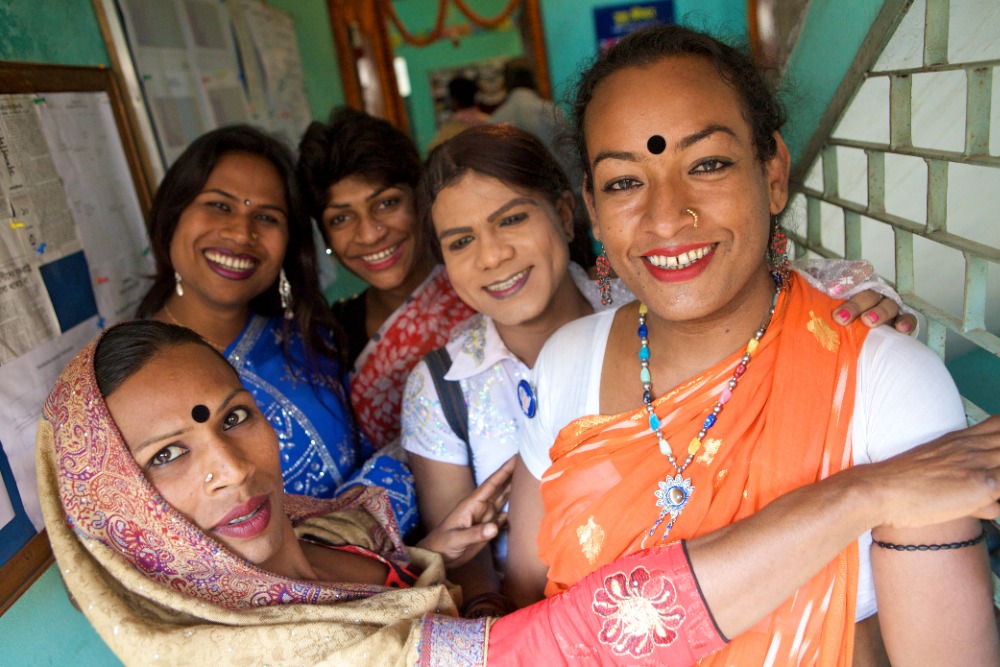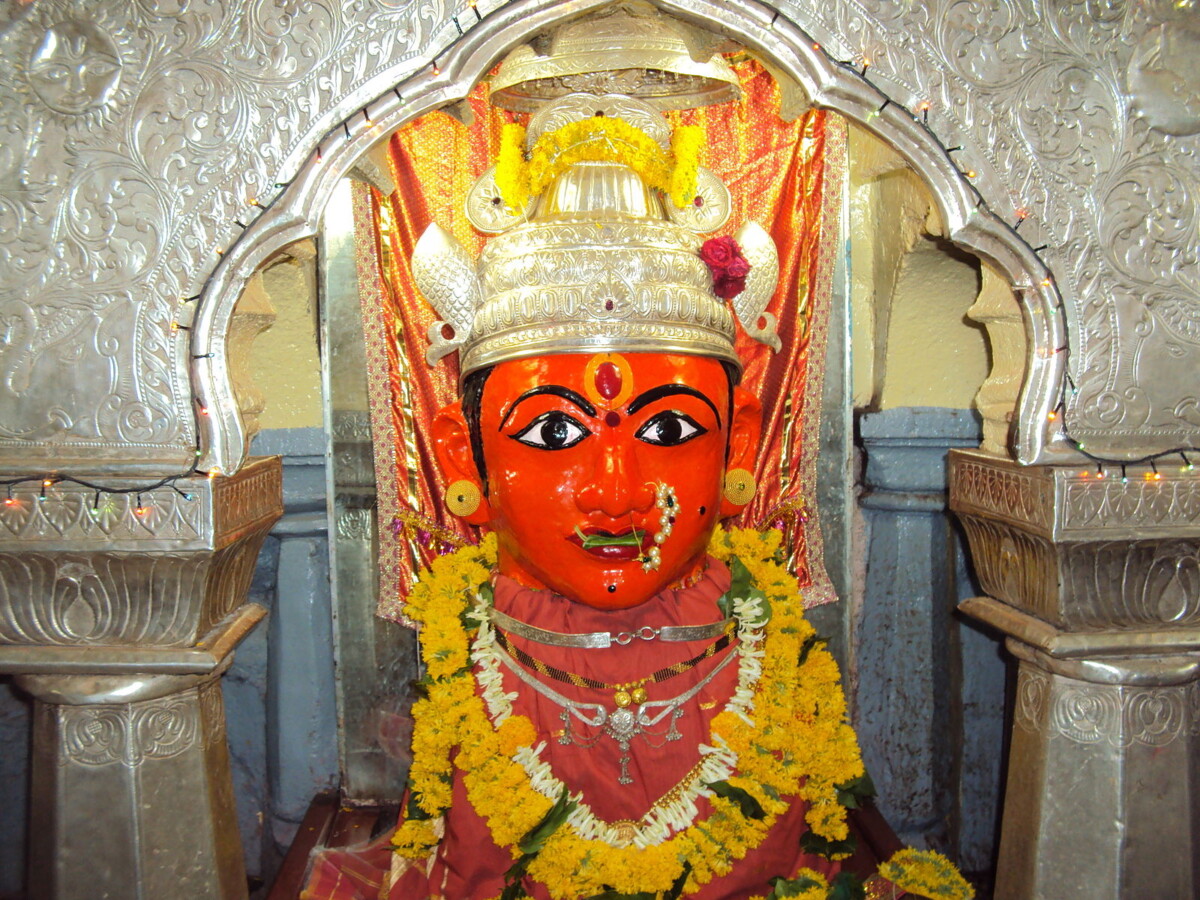When the Hindu American Foundation (HAF) published the first edition of its position paper in 2015, few Hindus, let alone Hindu organizations, openly discussed topics related to the LGBTQ community. In contrast, support and opposition to the LGBTQ community had already been a defining feature of American culture wars and political organizing, for decades. It is for that reason that HAF made the decision to take a public stand, as Hindus grounded in timeless spiritual principles, in support of the rights of LGBTQ people.
HAF Policy Brief:
LGBTQ Rights
Introduction
The modern LGBTQ movement came about in the post-war West as a response to a society whose legal, cultural and healthcare systems actively criminalized, stigmatized and pathologized their existence. In the 55 years since Stonewall, many in the West have gone from viewing LGBTQ people in terms of mental illness or sin, to a community deserving of equal rights and protections. Yet the scale and pace of change within the past decade is perhaps even more profound.
It is easy to forget that antisodomy laws, frequently used to blackmail and marginalize LGBTQ people, were only struck down by the US Supreme Court in 2003. India only struck down its analogue, the colonial-era Section 377, in 2018. In 2002, only 51% of Americans believed homosexuality was acceptable, passing 70% in the years following the Obergefell v. Hodges ruling in 2015, which legalized same sex marriage in the United States. While only 15% of Indians considered homosexuality acceptable in 2013, today over 50% of Indians (the majority of whom are Hindus) support same sex marriage.
In 2014, the Indian government formally recognized a “third gender,” and in 2019 passed The Transgender Persons (Protections of Rights) Act, which allows for self-identification of gender and includes provisions aimed at protecting transgender people from discrimination. At the same time, the Indian government and its largest political party, the BJP, do not support same sex marriage. The Rashtriya Swayamsevak Sangh — often described as the ideological parent of the BJP — has signaled they acknowledge gays and lesbians exist as a community based on immutable, naturally occurring traits relating to sexual orientation. The Indian National Congress, India’s main opposition party, stated in its 2024 campaign manifesto that it supports civil unions for same sex couples.
In the United States, the movement is no longer as defined by discrete legal victories on issues like gay marriage or decriminalization. However, LGBTQ topics on their own are still very much a culture war flashpoint, and remain associated with broader social and political movements throughout the world.
We updated this guide not only to reflect the current moment, but also to inspire nuanced, compassionate and spiritually grounded perspectives beyond the limits imposed by contemporary political polarization and dogmatism.
What the Hindu Dharma Traditions Say
Hindu Dharma traditions are diverse, expansive and concerned with the seeking of Truth
Kandukuru Nagarjun from Bangalore, India, CC BY 2.0, via Wikimedia Commons
The Hindu Dharmas are a diverse family of spiritual traditions which offer philosophies, teachings and practices towards the aim of managing and ultimately freeing oneself from the effects of life’s ups and downs (mokṣa/nirvāna). Pluralism and spiritual freedom are core values to these traditions, embracing a “both/and” as opposed to an “either/or” lens, where context is key to accurate understanding and application of spiritual principles.
As a result, Hindu Dharma traditions are numerous and expansive. Hindus may undertake any spiritual practices (or none), whether or not they’re guided by a spiritual teacher or follow a particular Hindu Dharma tradition. Being a Hindu is not contingent upon having a particular ancestry, or adhering to one specific set of rules universally applicable to all communities. There is no centralized pontifical body with an authority to define Hinduism or Hindus, let alone one with the capability to “excommunicate” or define someone as “not Hindu.”
Naturally then, Hindu communities have diverse sets of beliefs and opinions on contemporary social and political issues. The question then isn’t whether Hinduism “permits” or “forbids” being LGBTQ, as core Hindu sources of knowledge do not define homosexuality or gender nonconformity in terms of sin or transgression. The question has instead always been how Hindus apply spiritual principles such as the inherent divinity of all beings, compassion, mutual respect, equanimity, non-harm and the pursuit of Truth towards LGBTQ people, including members of their families and communities.
LGBTQ Hindus can authentically live their lives according to Dharma.
“The ātman of a person who has not yet been enlightened is born [again and again] sometimes as a man, sometimes as a woman, sometimes as non-binary (na-ubhayam), sometimes as a god sometimes as a human, sometimes as an animal – in accordance with their nature and karma.”
Śrī Bhāgavata Purāṇa 4.29.29
“Just as a spider sends forth its thread, and as tiny sparks spring forth from a fire, so indeed do all life, all planets, all deities, all living beings spring forth from this ātman.”
Bṛhadāraṇyaka Upaniṣad 2.1.20
Broadly speaking, most Hindu Dharma traditions hold that one’s ātman (self or individual essence) is beyond the physical form of a singular lifetime, and by extension beyond one’s gender.
“A person who is compassionate, friendly and does not dislike any living being, who is not greedy and who has no ego-centricity, who is equipoised in sorrow and happiness, who is patient and content always, who strives for Oneness as a fixed goal, and who has thus offered their mind and intellect to Me, that person is very dear to Me.”
Bhagavad Gītā 12.13-14
As human beings exhibiting natural variation in sexuality and gender expression, LGBTQ people are no more barred from living a life of purpose and devotion than anyone else. There are no references in Hindu sources of knowledge that justify continuing to treat LGBTQ people as unnatural and condemnable; though some passages have been translated and interpreted as otherwise since the colonial era. When given the chance, LGBTQ people have proven just as willing and capable to live as devotees and contribute to the wellbeing, security, and prosperity of their families, communities, and countries.
An LGBTQ person who strives for a life of selflessness, mastery over impulses and devotion is still closer to mokṣa than a heterosexual householder enslaved by desires. To put it even more simply, being straight is neither necessary nor sufficient for a Dharmic existence or mokṣa.
The rich diversity of Hinduism and Indian cultures include diversity of sexuality and gender expression
While the terms nested under “LGBTQ,” and the modern LGBTQ movement, are undeniably Western in origin, LGBTQ people are not themselves products of modern, Western culture. Millennia of Hindu sources of knowledge, itihasa or histories, folk traditions, and other accounts attest to the existence of diverse expressions of sexuality and gender throughout India.
On whether sexual orientation or gender identity are innate and/or immutable characteristics, the Charaka Saṁhitā states (4.4.14): “The fetus there are certain characteristics which are permanent and some that are temporary. The permanent characteristics distinguish whether the fetus will develop with the male, female or non-binary gender.”
On the welfare of LGBTQ people being considered matters of good governance and leadership, Vaśiṣṭha Dharmaśāstra says (19.35): “A king (therefore governments in the modern day) should support/care for both mental health patients and the non-binary people [without family to do so].”
In addition to describing people of diverse gender and sexual orientations, the Kamasutra mentions the existence of urban same sex couples “who desire the best for one another; those whose faith [in each other] has grown sufficiently do get married to one another.”
Hindu knowledge sources, particularly medical treatises, approached gender and sexuality with nuance and in multi-dimensional terms, in effect treating gender as an attribute that highly overlaps with, but is still distinct from sex. Overall, human beings are divided into three main categories of gendered innate traits: feminine, masculine or third natured (Tṛtīya-prakṛti in Sanskrit). The third can be further divided into seven general categories, and over 40 specific categories based on combinations of biological sex, sexual orientation, gender identity, physical capability and sexual interests.
| MAIN CATEGORY | |||
| Strī-prakṛti | Gender conforming heterosexual female | ||
| MAIN CATEGORY | |||
| Puṁ-prakṛti | Gender conforming heterosexual male | ||
| MAIN CATEGORY | |||
| Tṛtīya-prakṛti | Intersex, transgender and gender conforming non-heterosexual males or females | ||
| GENERAL CATEGORIES | |||
| Napuṁsa | all subtypes of non-heterosexual and impotent males | ||
| Nastriyaḥ | all subtypes non-heterosexual and impotent females | ||
| Klība | homosexual, bisexual and transgendered males | ||
| Paṇḍa | impotent males | ||
| Ṣaṇḍha | effeminate males, male-to-female transgenders | ||
| Svairiṇī | homosexual female | ||
| Strīpuṁsa | masculine females, and female-to-male transgenders | ||
| SPECIFIC CATEGORIES | |||
40+ based on combinations of:
|
|||
LGBTQ people must not be excluded from pursuing knowledge, wealth, love and spiritual growth.
Hindu traditions’ capacity to offer space and affirmation for third natured people became increasingly constricted, especially through British colonization and subjugation. Hindus who were Third Nature were systematically criminalized and punished through targeted legal measures and exclusion from social and economic opportunities.
Consequently, Hindu Dharma traditions’ tolerance has often made little practical difference to LGBTQ Hindus in modern times. Like their counterparts in other religious communities, many are rejected by families and friends, face physical and sexual abuse, and encounter barriers in accessing education, healthcare and justice.
Over centuries, many transgender, gender non-conforming and intersex Indians, popularly known as hijra or kinnar (see FAQ for definition), developed their own systems of social organization, support and community known as the guru-chela (teacher-disciple) and jamaat system, a broader network of guru-chela households. While superficially reminiscent of western notions of LGBTQ “chosen families,” guru-chelas and jamaats often involve considerably more structure, formalized traditions, and obligations. Most require members to financially contribute to and obey their gurus. Excluded from their families and society, the few sources of livelihood available have been sex work or collecting alms from begging or ceremonies.
In contrast, gender conforming lesbian, gay and bisexual Hindus, like their counterparts in other communities, often had lives defined by secrecy and superficial conformity. Hindu communities throughout history have placed immense spiritual, social, economic, and cultural significance to the institution of heterosexual, procreative marriage. The pressure to abide by familial and social expectations, along with colonial era laws like Section 377, undoubtedly made being openly lesbian, gay or bisexual a difficult, if not precarious existence.
LGBTQ people exist beyond America’s Culture Wars

Recognition of being gay, lesbian, bisexual or transgender as an immutable trait (not a “choice”) played a considerable role achieving legal and mainstream social acceptance. However, many American activists today view such “born this way” inspired arguments as anachronistic, essentialist and entangled with problematic notions of a gender binary. Amidst widespread acceptance and integration into society and institutions, considerable attention has shifted away from the “cisgender” or gender conforming “LGB” side and towards the “TQ” (transgender and queer).
While Hindus may be influenced by excesses of either the Western political right’s or left’s polarized attitudes around gender and sexuality, they should not forget that India, Pakistan, Nepal and Bangladesh all legally recognize a “third gender.” These countries have enacted laws and policies that could be viewed as “promoting gender ideology” in a Western context, while also remaining relatively “traditional” when it comes to gays and lesbians seeking to live openly and as married couples. Nepal, which was never under colonial rule, has never criminalized same sex activity. In April 2024, it became the thirty-seventh country in the world to legally recognize same sex marriage. It should be noted however that adoption of children remains off limits for same sex couples in Nepal.
Assuming Western countries like the United States provide the sole model for understanding LGBTQ people or defining the aims of LGBTQ movements, or that highly religious, non-Western and developing societies like India have nothing to offer is, at best, extremely short sighted. Whether or not traditional Hindu concepts like the Third Nature are applicable in an American context, the perspectives of diverse LGBTQ peoples and cultures help us overcome the limits imposed by our current political discourse and cultural paradigms. LGBTQ people exist both within and beyond the current political moment.
Children must be safe and feel safe discussing LGBTQ issues with their parents.
Parents play the definitive role in protecting their children and preparing them for adulthood. Naturally, this often leads to intense concerns about influences their children are subjected to, especially amidst rapid social changes. Whether or not a minor identifies as or is LGBTQ, they can still be bullied or face disparate treatment simply on the basis of being perceived as LGBTQ. Children may display resonance with LGBTQ categories out of curiosity, allyship or as part of their own self-discovery — a process that in some cases can last years.
Abusing a child, expelling a child from their home or allowing hysteria, prejudice, dogmatism, or shame to overpower a parent’s love and duty to protect their child, is not Dharmic.
Parents can and should take an active role in their child’s education, including broaching uncomfortable topics at an appropriate age. Countless tragedies could be averted if children felt safe and were safe in being able to have open and honest conversations with their loved ones.
The Chanakya Niti, a treatise of aphorisms on ethics dating nearly two millennia ago, states that after a child attains 16 years of age, parental duties should reorient from simply providing and correcting to specifically, treating the child as a friend. As such, their self-expression should be given precedence, and it is after this age that Hindu knowledge sources generally view people as ready to have open and frank discussions about gender and sexuality. Of course, as sex ed is generally offered at the end of grade school in the American public school system, the need for age appropriate conversations may begin earlier.
Hindu knowledge sources such as the Mahabharata and Arthasastras have acknowledged that children can display signs of gender and sexuality, but also that there are appropriate stages of life and contexts for when these topics should be explored. Hindu knowledge sources viewed sex as natural and pleasurable, but also with attendant issues beyond merely venereal disease or social consequences. The influence of sexuality on a person’s emotional and mental development were subjects of open inquiry and exploration until subsumed by more conservative outlooks following colonization.
Hindu Americans are capable of being the voice of compassion and wisdom
Hindus have always held diverse opinions on a variety of issues. Some maintain conservative social ideals, while others seek to more actively harmonize their ancient traditions with modern, globalized culture. Whatever the case, approaches to gender and sexuality should not be grounded in ignorance, malice, or dogmatism.
As Hindus, we know that our lives have meaning beyond the identities and affiliations of our present material existence, and that both our traditions and recent scholarship provide space for tolerance, nuance and wisdom, including objective, evidence-based research. It is these values, and not prejudice, fear or ignorance, that should serve as our guiding light.
Frequently Asked Questions
I am gay or transgender. How do I tell my family?
Coming out can be an incredibly difficult and stressful process, especially if there’s a risk of severe consequences. Do so at your own pace and only when you’re ready. Whatever you decide, we encourage you to seek support through allies in your personal network, LGBTQ organizations or LGBTQ-friendly spiritual guides and mental health professionals.
As you share your identity with them, be assured in who you know yourself to be, and offer grace to yourself if you have challenges communicating with them. Offer grace to them as they may be letting go of long held conceptions of who you are or how they thought your life would look, given that their upbringing may mean that they have many fears for you.
Am I going to hell because I’m gay or transgender?
No.
Hindu Dharma Traditions have far more expansive ideas around gender and sexuality. Moreover, they do not promote ideas of an eternal heaven or hell. No individual or group can be deemed condemned to eternal damnation. Indeed, all beings are innately eternally blissful — knowledge helps them uncover and exist in this frame of mind.
Can I have a Hindu marriage with my same sex partner? How about other ceremonies, like samskaras?

Yes. If you’d like assistance in finding an LGBTQ-friendly Hindu priest, please reach out to us!
In recent years, some Hindu pujaris and same sex couples in the US and around the world have adapted and found acceptance in traditional Hindu wedding rituals.
Hindu Dharma traditions have a variety of partnership blessing ceremonies – from the traditional 8 types of the Mimamsakas to the numerous ceremonies performed in various regions by diverse communities. In some cases, it is a private event – with just the couple in question present. Others feature an officiant and the most elaborate involve the presence of family members and elders as a blessing, affirming presence.
Historically, and in line with the teachings of all the Hindu Dharma traditions, the svayamvara/gāndharva vivāha ceremony is preferred for everyone – straight and LGBTQ. Although foreign rulers typically viewed only specific types of marriage ceremonies involving an officiant as legal (which led to the prevalence of the Brahma-Vivāha-Saṁskāra which has such parameters), now such pressure seldom exists in America. Accordingly, the gāndharva vivāha ceremony is seeing a resurgence, in part due to its eminent flexibility.
It is actually the type of marriage ceremony mentioned in ancient sources such as the Vātsyāyanīya-Sūtras for members of the third nature. Other Mimamsaka and Smarta ceremonial officiants prefer to approximate a ceremony that resembles the Brahma-Vivāha-Saṁskāra, replete with Agni, the Being of Fire, as the witness and the formal seven steps and four circumambulations.
While a government may regulate laws pertaining to marriage from a civil perspective, the religious rites of marriage itself are a matter of religious freedom, which for Hindu Americans is enshrined under the First Amendment. While HAF firmly holds that same sex marriage has basis within our traditions, individual sampradayas, temples, religious leaders and pujaris have the inalienable right to define marriage in conformity with their traditions, as they continue to interpret and reinterpret them over time.
My child says they are gay or transgender, what should I do?
Children should be safe and feel safe discussing issues of gender and sexuality with their parents. Your child coming to you is an indication that you’ve successfully instilled that trust, so the best thing you can do is not give them the impression that such trust was misplaced.
Seek first to understand and be open about things you don’t know. You may need a space to process your fears for your child, given an unequal and imperfect world, without burdening your child with them. You will need to have grace for yourself and the mistakes you make, and grace for your child and the challenges they have in articulating everything they may be feeling as they navigate the journey of their gender or sexual identity with you. Meeting other parents in similar situations (see FAQ for relevant resources) can also be extremely helpful.
The divine spark in your child remains the same and bowing to this is a powerful way to navigate the multiple aspects making such conversations difficult for both parties.
My child started using different pronouns after learning about them in school. What should I do?
Gender identity and sexuality can be confusing and complicated topics, even for adults. If you are informed or discover that your child is using different pronouns, the most important thing is to react with curiosity. Using a different pronoun or presenting in a gender nonconforming manner do not necessarily signify intention to socially or medically transition.
HAF has long supported the rights of parents to be involved in their children’s education and upbringing. Productive relationships built on trust and mutual respect between parents and their children, and parents and educators are crucial. Supporting the LGBTQ community and protecting children are not mutually exclusive, nor are they conditional on accepting the loudest arguments at face value.
Is the LGBTQ movement anti-India or anti-Hindu?
No.
The Indian LGBTQ movement being influenced by or connected to Western organizations does not mean its supporters are alien or hostile to India. There are countless LGBTQ Hindus who uphold Hindu Dharma traditions and treasure their connection to India as a spiritual homeland. Many have done so regardless of how welcome they’ve been in the homes and hearts of other Hindus.
Is this a Western import? How many genders are there?
The recognition that there are three broad gender categories (feminine, masculine and the third natured) has a strong foundation in Hindu culture, going back centuries. It is most certainly not a Western import to India.
Within this three gendered trait framework, Hindu sources of knowledge count dozens of distinct composite sub-genders based on permutations of biological sex, gender identity, sexual orientation and sexual preference.
The governments of India, Pakistan, Bangladesh, and Nepal now all recognize there are three genders. In India, changing one’s legal gender does not require proof of any medical gender transition procedures.
That being said, many laws, such as those related to adoption, sexual assault, inheritance, or social welfare, are ironically written to be specific to only one of two genders. Such inconsistencies, combined with historical marginalization and prejudice, can severely undermine the practical benefits of even well intentioned laws and policies.
Key Terms
What does “LGBTQ” mean?
“LGBTQ” stands for lesbian, gay, bisexual, transgender, and queer. In some instances, the Q has also referred to “questioning.” Occasionally “IA+” is added denoting intersex, asexual, and other identities based on sexual orientation or gender identity respectively. In Canada, “2S” which stands for “two spirit” (a term associated with indigenous communities in North America) is often added before lesbian to form “2SLGBTQIA+.”
What does “queer” mean, is it the same thing as “gay?”
“Queer,” originally meaning strange or peculiar, gradually evolved into a pejorative term for effeminate or gay men in the early 20th century. LGBTQ activists in the Anglophone world began reclaiming it as an umbrella term for people who are not heterosexual or gender conforming in the mid to late 20th century.
In the 1990s, Queer Theory, and other post-structuralist Critical Theory paradigms, became increasingly mainstream among western scholars in the humanities and social sciences. Today, “queer” frequently indicates an identity based on a rejection of traditional, Western notions of a gender binary or fixed categories such as gay and straight, or male and female. Self-identification, whether as queer, trans, a woman, or a man, is also seen as the paramount criteria for determining classification into any of those categories.
Within this framework, gender and sexuality must be seen through an “intersectional” lens, as in they do not exist in isolation to other social categories such as race, ethnicity or class, and by extension the intersection of multiple systems of oppression inherent in all those categories. As such, many see their struggles as queer people as inextricably linked to a broader movement of collective liberation of oppressed peoples. Achieving that, they believe, requires orienting education, the arts, community organizing, advocacy and all other aspects of culture and society towards collective liberation.
Although the term ‘queer’ and Queer Theory are rooted in Western social and political movements, both have also become prevalent outside of the West, including India. However, people whose gender identity or sexual orientation would fall under the umbrella of LGBTQ have, of course, existed regardless of their exposure to Western activism or academia.
Who are Hijras?
While often erroneously translated as ‘eunuch’ or ‘hermaphrodite’, hijra is generally defined as a person who is born male with feminine gender expression. The term hijra became popular during Islamic rule, with terms such as kinnar being used among Hindus. In addition, many communities also have identities that incorporate gender as well as their spiritual, ethnic, regional or linguistic affiliations.
References to gender fluidity, as well as people now referred to as hijras or LGBTQ exist throughout Hindu knowledge sources. In the Mahabharata, the daughter of King Drupa, Shikhandini, was a reincarnation of Amba who had vowed to take revenge on Bhishma after ruining her prospects with a prince she was in love with. Through powers granted from a Yaksha (forest guardian Being), Shikhandini transformed into the male Shikhandi and played a key role in Bhishma’s ultimate defeat. Chitrangada, a princess of Manipur and later wife of protagonist Arjuna, was raised as a boy by her father since he had no other heir. During his year in exile, Arjuna himself took on the identity of Bribannala, a kliba (hijra) music and dance instructor at the court of King Virata.
Mannspaarth, CC BY-SA 4.0, via Wikimedia Commons
In Gujarat, hijras are popularly associated with Bahuchara Mata, and often play a role in distributing prasadam (blessed offering) to devotees. Yellamma, described as a form of Renuka, is another deity associated with hijras, primarily in South India. In 2018, the first post-colonial Kinnar Akhara (religious order) was re-established and debuted at the Kumbh Mela in 2019. In addition, loosening social and legal barriers have also created the space for LGBTQ Hindus to publicly assert their existence as both Hindus and people who are LGBTQ.
Resources for LGBTQ Hindus
Many Hindu spiritual guides, organizations, and student groups have, to varying degrees, publicly expressed support for LGBTQ inclusion. In addition, organizations serving LGBTQ South Asians or Asian Americans may offer resources that culturally resonate with Hindus of Indian or South Asian descent.
In either case, HAF strongly advises exercising individual judgment in assessing whether an organization or community is, in fact, welcoming to people that are both Hindu and LGBTQ.
LGBTQ Hindus and their families can consider reaching out to:
- For LGBTQ Hindus
- For Parents
- PFLAG (American advocacy org catering to families of LGBTQ+)
Victim of assault or a hate crime?
If you or a loved one has been experiencing bullying, discrimination or have been the victim of assault or a hate crime:
- The Trevor Project – Suicide Prevention for LGBTQ+ Young People
- FBI Hate Crime Reporting
- US HHS resources for victims of domestic violence
If you are LGBTQ and have been experiencing thoughts of suicide, please dial 988 or seek other forms of help immediately.









































